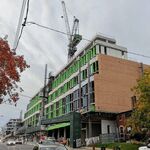interested
Senior Member
I just can't see how it will be better.
That said, in Germany now the 10 year Bund (German Bond)is -ve. It was oversubscribed for people to be returned less than they put up. The reason....people are betting with QE in Europe the bonds will go even more negative and they can sell these at a profit.
So is it possible that simply treading water will be worth more? Yes but it seems unlikely.
It will take Toronto's status as a world class city, worsening economics or something for this to happen.
Also, remember there is the currency play and while to a foreigner we are "on sale" if he / she is comparing to the USD, I am not so sure that is the case for a Chinese person in Yuan or European in Euro which have also devalued. For an American, it would make little sense if their currency is going to appreciate further vis a vis the C$ but who knows what will happen with currency.
That said, in Germany now the 10 year Bund (German Bond)is -ve. It was oversubscribed for people to be returned less than they put up. The reason....people are betting with QE in Europe the bonds will go even more negative and they can sell these at a profit.
So is it possible that simply treading water will be worth more? Yes but it seems unlikely.
It will take Toronto's status as a world class city, worsening economics or something for this to happen.
Also, remember there is the currency play and while to a foreigner we are "on sale" if he / she is comparing to the USD, I am not so sure that is the case for a Chinese person in Yuan or European in Euro which have also devalued. For an American, it would make little sense if their currency is going to appreciate further vis a vis the C$ but who knows what will happen with currency.





